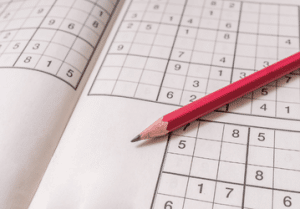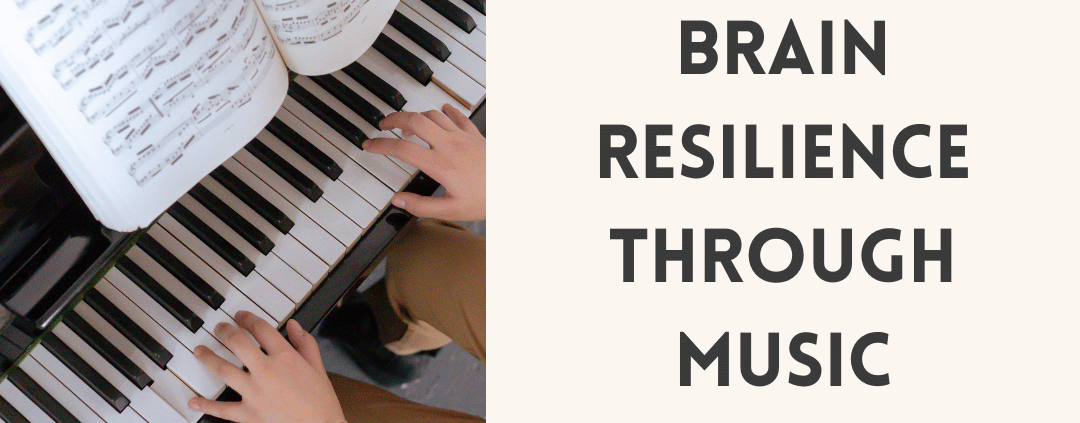Brain Resilience Through Music
The importance of keeping the brain limber
 When I took up the piano, little did I know the wonderful side effects! It is a great way to improve brain resilience! To keep our brains resilient we need to take care of our brain’s cognitive and emotional health. Keep your brain healthy by stimulating it with activities that challenge it.
When I took up the piano, little did I know the wonderful side effects! It is a great way to improve brain resilience! To keep our brains resilient we need to take care of our brain’s cognitive and emotional health. Keep your brain healthy by stimulating it with activities that challenge it.
I took up the piano a few years ago. When I did so it was just for a bit of fun and enjoyment. I had dropped it as a child because the need for daily practice was too demanding. Several decades later I decided to give it another go. I’m still terrible and practicing, but I really enjoy the experience.
I am still only at grade 3 level, but I am determined to get to a standard in 2023, where I can sit and play some of my favourite pieces. One I am determined to play is Comptine D’Un Autre Ete by Yann Tierson. It is from the film Amelie. It is also one of my husband’s favourite pieces so I will learn how to play it for him. Now that is a great way to motivate progress! Goodness, I seem to be making new year resolutions already!
Why I keep up with learning the piano
Playing piano is particularly good because of the need to multi-task – reading and playing at the same time. Plus the need to be able to coordinate the left and the right hand with the different lines of music.
It creates strong brain activity in these areas and bridges the gap between the two hemispheres of the brain, increasing activity in various areas of the brain. Increasing the connections between different areas of the brain allows messages to cross through faster and via more diverse roots, improving problem-solving abilities and increasing their creativity. Of course this goes hand in hand with increased resilience.
The best part is that you don’t have to become a master pianist to take advantage of these unique benefits. Playing regularly for just five months at a beginner level at any age can induce positive changes in the structure of the brain, increasing IQ and making it easier to master skills used not just in front of the piano but throughout everyday life.
Here are some other ways to build brain resilience.
Ways to get your brain working harder and staying sharp longer.
Play Brain Games
Challenge your brain with mental puzzles, word games, and other puzzles. Switch up the challenge every day to keep your neurons firing. Perhaps learn a new subject. Expand your knowledge by learning something new. Whether it’s a new language, history, or science topic, keeping your brain active can help you retain information.
Whether it’s a new language, history, or science topic, keeping your brain active can help you retain information.
Make sure you remember to take brain breaks. Make time for yourself and take a break from work to do something that stimulates your mind. Go for a walk, read an interesting book, or take on a challenging Sudoku puzzle. I am sure you have experienced this; you try and try to come up with a solution to a problem, but nothing comes. You take and walk and think about something else and viola – problem solved.
Try some calming brain-boosting activities before bed. Get some zzzs by trying out some relaxation techniques, like deep breathing exercises or meditation.
Do you enjoy puzzles, board games, or other activities requiring coordination? Taking part in these activities regularly can keep your brain sharp.
Read Books
Whether you’re savoring a good novel or catching up on your favorite magazine, reading can help stimulate your brain. If you are reading a good novel, as tension is built in the story, more and more areas of the brain light up with activity.
A growing body of research indicates that reading literally changes your mind. Using MRI scans researchers have confirmed that reading involves a complex network of circuits and signals in the brain. As your reading ability matures, those networks also get stronger and more sophisticated.
In 2009 A US study found that 30 minutes of reading lowered blood pressure, heart rate, and feelings of psychological distress. The same study found that yoga and a good laugh also had the same beneficial effects.
Brain-Building Music
Listening to music that is stimulating and upbeat can help keep your brain active and learning. Find music that appeals to you and stick with it! Personally, I love to play Workout Pulse from my Amazon playlist. I use it when I am working out and when I am in the kitchen cooking.
Get Active
 It is a long-established fact that exercise is good for our bodies but what about brain resilience? The evidence is very clear – leading a physically active lifestyle provides benefits for overall health and wellbeing. Studies have repeatedly shown that people who are physically active throughout their lives have a lower-than-average risk of a decline in thinking skills with aging.
It is a long-established fact that exercise is good for our bodies but what about brain resilience? The evidence is very clear – leading a physically active lifestyle provides benefits for overall health and wellbeing. Studies have repeatedly shown that people who are physically active throughout their lives have a lower-than-average risk of a decline in thinking skills with aging.
The same goes for ‘purposeful exercise’ – meaning exercise that involves moderate to vigorous exertion that we take deliberately. In randomised controlled trials, people who took part in purposeful exercise showed beneficial changes in brain structure and function.
So if you want to keep your mind sharp and your body healthy, make sure to incorporate physical activity into your day-to-day life, and make time for some purposeful exercise too! You will see noticeable changes in brain resilience in just 6-12 months.
Take Classes
 Classes aren’t just a way to pass the time – they can actually help keep your brain active and sharp. If you’re interested in a new hobby or want to improve your job performance, taking classes is a great way to learn new things and keep your mind fresh. With so many options available, you’re sure to find a class that’s perfect for you.
Classes aren’t just a way to pass the time – they can actually help keep your brain active and sharp. If you’re interested in a new hobby or want to improve your job performance, taking classes is a great way to learn new things and keep your mind fresh. With so many options available, you’re sure to find a class that’s perfect for you.
Take Music Lessons
Not only is it fun, but also taking music lessons can keep your brain active and learning. Whether you chose something challenging where you have to coordinate both hands, whilst reading 2 lines of music or something a little more gentle is up to you. Of course, singing is equally rewarding. Another one of my favourite pastimes.
Dancing Lessons
Another great one for building brain resilience but also for building coordination. It also checks the boxes for taking new classes, learning something new, and getting active. An all-round win, win.
These tips will help you keep your brain limber so you can think clearly and problem-solve effectively for the rest of your life. I’m off to do some piano practice now.



